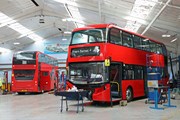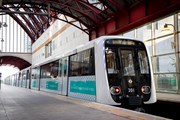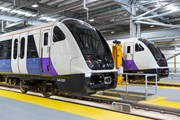
Thursday 19 Oct 2023
New analysis shows how TfL’s spending with UK-wide supply chain supports billions of pounds of economic growth across the country

PN-123
- Analysis of TfL’s UK-wide supply chain shows the positive economic impact that investment in London’s public transport system has across the country as a whole
- TfL investment in its UK supply chain worth £5.9 billion in Gross Value Added to the UK economy in the last year alone, supporting more than 100,000 jobs from Falkirk to Farnborough
- £810 million invested with more than 180 suppliers in the North West and North East alone, supporting 14,000 jobs
- Despite multi-year financial settlements to other devolved city regions often being termed “London-style funding deals”, London itself still has no such long-term funding arrangement
A new independent report, commissioned by Transport for London (TfL), sets out the powerful economic effect that sustained investment in London’s public transport system has across the whole country.
Launched at a reception attended by suppliers and key business stakeholders, hosted by the Railway Industry Association, the report by Hatch, a global engineering, project management, and professional services firm, showed how investment by TfL has huge benefit for its UK-wide supply chain. This in turn delivers wider benefits for the economy of the local areas where the suppliers are located, supporting jobs and economic growth across the country.
Throughout 2022/23, TfL invested £6.5bn with 2,072 suppliers, 93 per cent of whom were based in the UK and about half (49 per cent) were small to medium enterprises (SMEs). This amounted to a total economic output of £5.9bn in Gross Value Added to the UK economy and supported 104,230 jobs across the UK (direct, indirect and induced effect).
Analysis of TfL’s supply chain showed that two-thirds of its suppliers were based outside of London, with large numbers in the North West and West Midlands. Twenty nine thousand jobs are supported outside of London – the equivalent of the number of people directly employed by TfL. This includes 8,870 full time jobs supported in the North West, where TfL purchases a range of services and products including from Holbro Engineering Ltd - an SME engineering firm based in Fleetwood, Lancashire who provide TfL with precision-machined refurbished components for S-Stock trains which run on the Metropolitan, Circle, District and Hammersmith and City lines, and 5,160 in the North East where examples of products include steel needed for rail replacement works, supplied from British Steel in Scunthorpe. TfL is also purchasing zero emission buses manufactured across the UK, from Falkirk to Farnborough, helping to deliver a fully zero-emission bus fleet across the whole of London.
More broadly across the UK, TfL’s supply chain supports a wide range of SMEs, such as MDS ltd, who are based in Bedford and supply London Underground with fabricated escalator steps, as well as AJ Wells and sons who are based on the Isle of Wight and provide station signage and roundels across the TfL network. Across TfL’s Tier 1 suppliers, 59,500 direct jobs are supported by TfL’s supply chain. The analysis showed that for every £1m spent by TfL, 16 jobs are supported in the wider economy.
In each of the funding agreements with the Department for Transport (DfT) since May 2020, there has been consistent acknowledgement of the need for Government to support TfL's capital investment programme. Around the world, it is common for transport authorities to receive government support of this kind. In addition, the Government has recognised that cities benefit from long-term certainty of investment in their transport networks, as delivered through the City Region Sustainable Transport Settlements which were extended to 2032 as part of the March 2023 Budget. While these settlements have often been termed “London-style funding deals”, London itself currently has no such arrangement and no funding certainty beyond the end of this financial year.
TfL welcomes the commitment to invest in transport across the UK, boosting productivity in the country’s network of strong city regions. But the job of investment in London’s transport network is not yet done. If TfL were to receive a similar long-term capital funding deal, the number of jobs that could be unlocked across the UK, and the economic good this could deliver, would have the potential to grow significantly in the coming years.
TfL is on track to achieve operational financial sustainability during 2023/24, which means that Government funding is now being used to support capital investment. With the current funding settlement due to end in March 2024, TfL has continued dialogue with Government about long-term capital support. As part of this, TfL has set out to Government how £500m in capital support for 2024/25 is needed to support a range of critical projects which in turn would boost the UK economy.
The funding for 2024/25 would support for the continued replacement of the rolling stock on the Piccadilly line by Siemens Mobility, who is investing up to £200 million to manufacture at least 50 per cent of the new Piccadilly line trains at a new facility in Goole, Yorkshire, as well as allow TfL to progress with orders for a replacement fleet on the Bakerloo line, which is more than 50 years old and the oldest operational train fleet in the UK. If government support is not provided, then TfL will need to revisit its business plan to ensure it can continue to meet its contractual commitments, which will mean further impact and uncertainty to its supply chain outside London.
The funding would also support the delivery of a fleet of 54 new DLR trains, as well as allow procurement for new trams to replace the existing fleet in south London which have been in service for almost a quarter of a century and are reaching the end of their useful lifespan.
The funding would also allow for TfL to complete the major signalling upgrade on the Metropolitan and District lines, which will deliver a capacity increase across the line with more frequent services.
TfL's submission to government also reflects that there is no regular funding source for major road assets in London and makes the case for capital support to help deliver critical road renewal schemes on the A40 Westway and the southbound Blackwall Tunnel which could be completed in 2024/25 if supported.
The Mayor of London, Sadiq Khan, said: “London is the engine room of the UK, and this research demonstrates just how great TfL’s impact on the wider UK economy is, but also how much London needs the expertise from around the country that isn’t available in our capital. TfL’s investment has supported small businesses, created thousands of new jobs and brought in billions of pounds for the UK economy. To continue driving this growth we have exciting plans to further improve London’s transport infrastructure, but this can’t happen without the right funding deal in place. I’m urging the Government to work with us on a long-term funding deal so that we can continue to build a better, more prosperous London and country for everyone.”
Andy Lord, London’s Transport Commissioner, said: “This new report showcases just how powerful and economically positive TfL’s supply chain is, proving how the impetus to invest in the future of London’s transport network has never been stronger and that financial support for London should not be seen as being to the detriment of the rest of the country. We are a national engine of growth and our billions of investment in more than 2,000 suppliers last year alone supported more than 100,000 jobs across the UK.
“The report makes clear that it is wrong to view our transport network through a London-centric lens – nothing would be possible without the power and innovation of UK industry as a whole. This is another reason why we have to keep the momentum for investment up. But we cannot do this alone - we have set out how we need the Government to boost our own capital investment and provide financial certainty to London so that we can continue to support the capital with a safe and reliable network and can continue to support jobs and economic growth around the country.”
Darren Caplan, Chief Executive, Railway Industry Association, said: "The Railway Industry Association is pleased to host Transport for London’s launch of this report on the value of supply chains, which clearly demonstrates the critical value of investment in rail for supporting economic growth, driving innovation, and jobs across the UK. We continue to urge the Government to provide a long-term funding settlement for major projects in the capital, which will give suppliers the certainty they need to plan for the future."
John Dickie, Chief Executive of BusinessLDN, said: “Investing in the capital’s public transport network not only benefits Londoners but it also helps to support jobs and growth across the UK. This new research demonstrates the far-reaching economic impact of TfL’s supply chain and underlines how long-term investment can benefit the country as a whole. We urge the Government to agree a multi-year capital funding deal for TfL – similar to those already reached with Network Rail, National Highways and eight city regions across the UK – so that London and suppliers across the country can plan for the future with confidence.”
Sambit Banerjee, Joint CEO and Managing Director of Rolling Stock & Customer Service at Siemens Mobility UKI, said: “Our new rail manufacturing facility at Goole, East Riding of Yorkshire will bring up to 750 direct jobs, including a large number of apprentices, with many more in the supply chain. With manufacturing of the new Piccadilly line trains set to commence in Goole from early next year, we are keen for the certainty of future orders to ensure our factory can continue to be operating at full capacity, supporting the local economy. This is a key part of our longstanding relationship with TfL, having also delivered signalling and station systems for the Elizabeth line from our manufacturing facilities in Ashby and Chippenham.”
Jon Eardley, Managing Director, Abellio London – Transport UK Group, said: "TfL plays a vital role in stimulating the UK’s manufacturing industry and generates the critical mass needed for the development of new and innovative green transport technologies including ground breaking zero emissions vehicles from the likes of Wrightbus and Alexander Dennis.
"Innovations in public transport in London unlock the path for other UK city regions to transition to a zero emission future at pace, thereby meeting wider UK decarbonisation targets. London’s scale and influence on the supply chain also sustains many thousands of high skilled green jobs across the country, energising the economies of local communities from Ballymena to Bedford. With sustainable long term funding, TfL can continue to showcase the very best of the UK’s manufacturing expertise, securing the futures of thousands of aspiring young designers, engineers and leaders; and remaining a template for transport networks across the globe.”
Contact Information
TfL Press Office
Transport for London
0343 222 4141
pressoffice@tfl.gov.uk
Notes to editors
- The independent Hatch report can be downloaded from https://content.tfl.gov.uk/tfl-supply-chain-economic-impact-assessment-22-23.pdf
- All analysis is based on 2022/23 data and is based on Hatch’s economic model using postcode data of our suppliers, supplemented by a survey of TfL senior staff and analysis of bus manufacturing sites















